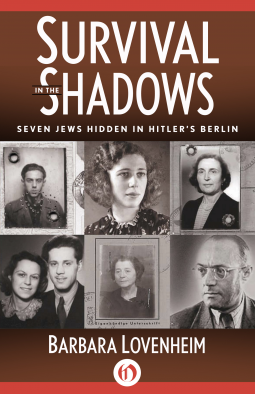Thank you, NetGalley for the opportunity to read and review this work.
* * * * *
I thank Open Road for the opportunity to read and to review Survival in the Shadows, by Barbara Lovenheim. The story was one that needs to be told—that cannot be forgotten—that we must do all we can to be certain is not repeated.
Barbara Lovenheim happened along the story of Ellen and Arthur Arndt and five of their family members, and how they managed to survive the last days of WWII hidden right under the Nazis’ noses, in what the party then regarded as a “Judenfrei” Berlin. She teamed up with the family to interview each of the members at length, so as to add personal details to their harrowing story, which she intended to tell. Lovenheim then set the story forth, complete with likely dialogue. The result is a tale of a family’s love, of the heroics of those willing to help their Jewish friends and neighbors, and of the fear in which the Arndt family lived in the last dark days of Hitler’s Germany.
Of late, I’ve read quite a number of WWII/Hitler/Holocaust stories, after a number of years of taking a reprieve from them. I suppose it is fair to say that what has motivated me, is an appreciation for the realities of the world in which we live today—a world in which evil seeks, once again, to extend its thorny hand of destruction to the “civilized” world.
I particularly appreciated Lovenheim’s approach to this story, which was to tell one of triumph, rather than one of misery. Yes, there were extraordinarily difficult days the Arndts lived through—times of hunger, and of fear they would be captured and sent to a concentration camp. Yet, Lovenheim seems to have concentrated on the very things that saved this family: faith in their fellow man, hope for mankind’s better future, and their love for one another.
* * * * *
I thank Open Road for the opportunity to read and to review Survival in the Shadows, by Barbara Lovenheim. The story was one that needs to be told—that cannot be forgotten—that we must do all we can to be certain is not repeated.
Barbara Lovenheim happened along the story of Ellen and Arthur Arndt and five of their family members, and how they managed to survive the last days of WWII hidden right under the Nazis’ noses, in what the party then regarded as a “Judenfrei” Berlin. She teamed up with the family to interview each of the members at length, so as to add personal details to their harrowing story, which she intended to tell. Lovenheim then set the story forth, complete with likely dialogue. The result is a tale of a family’s love, of the heroics of those willing to help their Jewish friends and neighbors, and of the fear in which the Arndt family lived in the last dark days of Hitler’s Germany.
Of late, I’ve read quite a number of WWII/Hitler/Holocaust stories, after a number of years of taking a reprieve from them. I suppose it is fair to say that what has motivated me, is an appreciation for the realities of the world in which we live today—a world in which evil seeks, once again, to extend its thorny hand of destruction to the “civilized” world.
I particularly appreciated Lovenheim’s approach to this story, which was to tell one of triumph, rather than one of misery. Yes, there were extraordinarily difficult days the Arndts lived through—times of hunger, and of fear they would be captured and sent to a concentration camp. Yet, Lovenheim seems to have concentrated on the very things that saved this family: faith in their fellow man, hope for mankind’s better future, and their love for one another.



